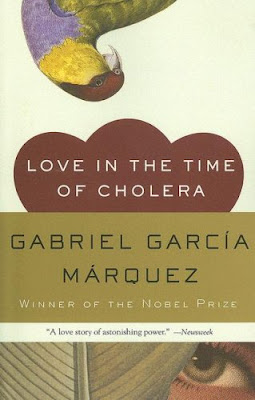Literary Pick (**)
-Gabriel García Márquez

The prose was vibrant, and I adore Marquez's spirit, but the details were grueling. It's sad that I didn't love it as much as I thought I would. I adored 100 Years of Solitude, and although they are both similar in style, with minimal dialogue, in which each chapter is at least 50 pages long, made it that much harder for me to get through. It seemed to me there were more descriptions about details than about the actual events of the love story itself. This was a hard one for me to get through. The only motivation to continue till the end was my faith in Marquez's ability to make it worth my while, and although, like I mentioned before, the prose is beautiful, Florentino's love alone wasn't strong enough to support the almost 400 page novel.
To me their love story was not convincing, and it's not that I'm prejudice about love stories involving older people, because one of my most cherished love stories of all time is "Bridges of Madison County". Cholera just didn't do it for me.
This is the second book I've read which was translated by Grossman, and again she did a wonderful job!
Labels: Márquez













